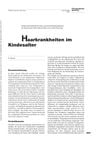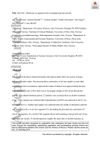Search
for
Sort by
Research
390-420 / 1000+ results
research Trichotillomania with Giant Gastric Trichobezoar in a Female Child: A Case Report
An 11-year-old girl with a hair-pulling disorder had a hairball in her stomach and was treated with medication, therapy, and a team of doctors.

research Kaleidoscope
Countries with stricter cultures had fewer COVID-19 cases and deaths, paranoia is linked to false memories, psychosocial intervention works as well with or without antipsychotic drugs for young people with psychosis, smartphones can detect changes in behavior indicating illness relapse, and recruitment agents show regional and gender biases.

research Hormone Replacement Therapy for Women with Premature Ovarian Insufficiency: A Comprehensive Review
The review recommends hormone replacement therapy for women with premature ovarian insufficiency to manage symptoms and protect health, with specific approaches for different groups.

research Book Reviews
The reviews highlighted practical advice and insights from various psychology and therapy books.

research Management of Sexual Dysfunction in Postmenopausal Breast Cancer Patients Taking Adjuvant Aromatase Inhibitor Therapy
Non-hormonal treatments should be used first for sexual dysfunction in postmenopausal breast cancer patients on aromatase inhibitors, with hormones as a second option.

research Psychodermatology in the UK: Psychological Impact and Integrated Treatments
Treating skin conditions with both psychological and dermatological care improves patient outcomes and can save costs.

research Obesity and Polycystic Ovary Syndrome
Obesity increases the risk of developing polycystic ovary syndrome, and weight loss can improve the condition.

research A Mixed Methods Survey of Social Anxiety, Anxiety, Depression, and Wig Use in Alopecia
Many people with alopecia experience high levels of social anxiety, anxiety, and depression, and while wigs can boost confidence, they may also cause anxiety.

research Self-Concept and Body Image of People Living with Lupus: A Systematic Review
Lupus patients' body image issues significantly affect their mental health and need more support.

research Hair Loss in Infancy and Childhood
The document concludes that understanding hair biology and recognizing hair conditions are crucial for managing and treating hair loss in children.

research Approaching Erectile Dysfunction in Dermatology Patients
Dermatologists should address erectile dysfunction in patients with skin conditions to improve their quality of life.

research Hair Disorders
The document concludes that accurate diagnosis and appropriate management are crucial for treating various hair disorders, which have significant psychological impacts.

research Hair Diseases in Childhood
Children's hair diseases include compulsive hair-pulling, easily plucked hair, scalp fungal infections, and head lice, each requiring specific diagnosis and treatment.

research Hair Presentation Test
The woman's hair loss pattern doesn't match typical conditions like alopecia areata or female pattern hair loss.

research Immunological And Some Biological Biomarkers Investigation In Patients With Systemic Lupus Erythematosus
No single biomarker is reliable enough for diagnosing and assessing SLE.

research Metabolic Syndrome – A New Definition and Management Guidelines: A Joint Position Paper by Various Polish Medical Societies
The Polish medical societies have redefined metabolic syndrome and recommend lifestyle changes, certain medications, and possibly bariatric surgery for treatment. They also discuss managing related health conditions.

research The Associated Burden of Mental Health Conditions in Alopecia Areata: A Population-Based Study in UK Primary Care
People with alopecia areata have a higher risk of depression and anxiety, and often face unemployment and work absences.

research Abstracts from the 4th Annual Student Medical Summit
The document concludes that more research is needed to reduce frequent hospital visits, addiction medicine education improves with specific training, early breast cancer surgery findings are emerging, nipple smears are not very accurate, surgery for older melanoma patients doesn't extend life, a genetic condition in infants can often be treated with one drug, doctors are inconsistent with blood clot medication, a certain gene may protect against cell damage, muscle gene overexpression affects many other genes, and some mitochondrial genes are less active in mice with tumors.
research Bupropion for the Treatment of Fluoxetine Non-Responsive Trichotillomania: A Case Report
Bupropion may help treat trichotillomania when fluoxetine doesn't work.
research Repetitive Transcranial Magnetic Stimulation for Treatment of Trichotillomania: Case Series
rTMS may help treat trichotillomania in some patients.

research Hair Loss in Children: A Detailed Overview of Pediatric Alopecia
The most common cause of hair loss in children is tinea capitis, followed by alopecia areata and telogen effluvium.

research Recommendations From The 2023 International Evidence-Based Guideline For The Assessment And Management Of Polycystic Ovary Syndrome
The 2023 guideline advises a detailed approach for PCOS, focusing on early detection, lifestyle and medical treatments, and managing health risks.

research Recommendations From The 2023 International Evidence-Based Guideline For The Assessment And Management Of Polycystic Ovary Syndrome
The 2023 guideline for PCOS suggests using updated diagnostic criteria, assessing related health risks, and recommends lifestyle changes and specific treatments for symptoms and fertility issues.

research Complications of Cushing's Syndrome: State of the Art
Cushing's syndrome can cause serious health problems, and early treatment is crucial, but some issues may remain after treatment.

research Fetal Alcohol Syndrome: Current Status of Pathogenesis
The document concludes that the exact way alcohol causes harm to fetal development is unknown, but it significantly affects nutrient transport to the fetus and a safe level of alcohol during pregnancy is not determined.

research Age-Related Changes in Male Skin: Quantitative Evaluation of One Hundred and Fifty Male Subjects
Male skin gets drier and more alkaline as it ages, which may need different skincare than women's skin.

research Trichotillomania: A Case Report with Clinical and Dermatoscopic Differential Diagnosis with Alopecia Areata
Trichotillomania is often misdiagnosed as alopecia areata and can be treated effectively with N-acetylcysteine and psychotropic drugs.

research Hair EtG: Alterations in Segment Levels Accompanying Hair Growth
EtG levels in hair decrease significantly after one month of alcohol abstinence.

research Atlas of Geriatric Dermatology
The book details skin conditions in older adults, their link to mental health, cancer treatment importance, hair loss remedies, and managing autoimmune and itchy skin.